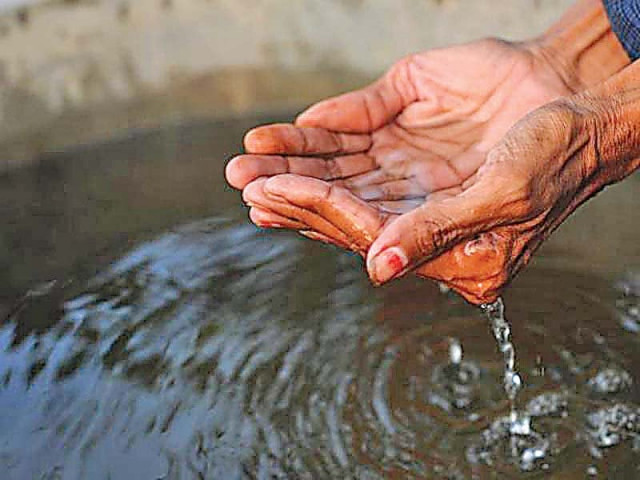Unchecked extraction to blame for depleting groundwater
Experts urge introduction of laws to regulate use and promote conservation

PHOTO: AFP
According to a 2015 irrigation department report, the water table in Punjab is going down by three feet a year. Around 20 years ago in Lahore, this essential resource could be extracted at 20 to 40 feet, but now drilling has gone as deep as 800 feet to find it.
With our water resources shrinking at a rapid rate, experts have stressed the introduction of laws to regulate underground extraction since the practice is putting a huge strain on water levels.
WaterAid Pakistan Country Manager Siddique Ali Khan tells The Express Tribune the problem is exacerbated by the lack of regulation.
“Big bottled water companies are using our country’s water and earning billions,” he underlines. “They are exploiting resources and taking revenues to their own countries. It’s a pity that the government has turned a blind eye towards the issue.”
New WASA chief vows to address water shortages
Punjab Urban Resource Centre Director Dr Imdad Hussain, who also wrote a policy paper titled Advocacy and Lobbying Gaps in Water, Sanitation and Hygiene (WASH) Policies in Punjab, says not one law exists to regulate municipal water.
The Punjab Municipal Water Act was introduced in 2014 to recognise, regulate and manage municipal water in Punjab; however, it has not been implemented.
“If the act is implemented, private bottled water companies will have to get licences to extract underground water in the country,” Hussain says. Through the licence, companies will be charged for the water they extract and a record of use will also be generated, he adds.
Meanwhile, Khan suggests that another way to keep track of consumption is to place water meters in companies, factories, fuel stations and residential areas. According to Khan, people use municipal drinking water indiscriminately as there is no metering, thus causing a lot of wastage.
He says water is cheap in the country and even though it is the state’s responsibility to provide the commodity to citizens, people must understand its value.
“We all know it is sinful to waste water, which is a lifeline. From our childhood, we are taught not to waste water, but we pay no heed as citizens,” Khan laments.
Hussain also agrees that since water is cheap in Pakistan, every house gets a bill at a flat rate and people tend to waste it. He adds wastage is high in middle class and elite homes, while those who are financially disadvantaged have limited access and are forced to consume contaminated water.
Gwadar residents observe shutter down strike to protest water, power crisis
“There is a huge disparity in supply,” he says. “Poor people sometimes don’t even get water, while we use it to wash our cars and homes and pay a standard bill every month.”
He points out most of the water is being used by commercial enterprises such as the construction sector, fuel stations and factories. “There is a dire need to pay attention to the conservation of this precious resource.”
“If the government installs water meters in houses and factories, people will not waste it as they will be charged according to usage,” says Hussain. “This will also instil a sense of responsibility.”
The World Bank has categorised Pakistan as a water-stressed country, likely to face an acute shortage in the next few years. Around 40% water is wasted due to leakages in deteriorating and rusting supply lines, it says.
Siddique Ali Khan, meanwhile, mentions that WaterAid has formed a group of 10 to 15 parliamentarians to mobilise them to eliminate water scarcity and ensure conservation. “It is important to work with them so they raise the matter in the assembly,” he said. The WaterAid chairman underlines that the Punjab government has increased its water and sanitation budget in 2017.
Hussain also points out that lawmakers need to put their heads together to ensure increased water storage facilities and reservoirs in the country.
He adds that creating awareness among people about conservation is also necessary and such topics must be included in the school curriculum.
Published in The Express Tribune, June 30th, 2017.



















COMMENTS
Comments are moderated and generally will be posted if they are on-topic and not abusive.
For more information, please see our Comments FAQ